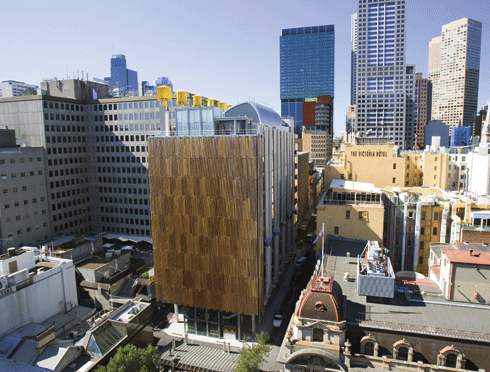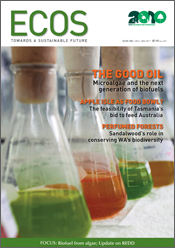
|
Published: 20 December 2010
Aspiring to consume less
The Prime Minister’s Task Group on Energy Efficiency has recommended a suite of measures to significantly reduce Australia’s energy intensity, and take advantage of financial, social and economic returns. Sarah Robertson, former editor of EcoGeneration magazine, argues that making the most of the opportunities identified by the report requires decisive and dedicated leadership.

|
|
Melbourne’s Council House 2 (CH2) achieved Australia’s first 6 Star Green Star – Office Design v2 rating through the Green Building Council of Australia. Credit: City of Melbourne
|
The Task Group’s report, released in October, identified that a household implementing just two energy saving technologies in 2020 could save $296 per year compared with a business-as-usual scenario.
The report recommends five foundation measures and a suite of complementary measures, which together with a price on carbon, would improve Australia’s energy efficiency performance. The foundation measures include a national energy-efficiency target of 30 per cent, a national energy savings initiative scheme, and a nation-wide strategy to build an energy-efficiency culture. Interestingly, the report found that while Australia has addressed improving minimum acceptable energy performance standards, it has not targeted world best practice and is lagging behind other OECD nations.
Environmental groups have welcomed the report as a comprehensive review and a blueprint for smarter energy use.
‘Improving energy efficiency, across all sectors of the economy, is long overdue and critical to ensure the long-term global competitiveness and productivity of a range of sectors from manufacturing to mining,’ says Deputy CEO of The Climate Institute, Mr Erwin Jackson.
Energy Efficiency Council CEO, Mr Rob Murray-Leach, says the report shows ambition and comprehensively covers a broad range of policies needed to address energy efficiency.
‘It’s not a case of there being a silver bullet in energy efficiency,’ he says. ‘We need a mixture of leaders to really drive it forward.’
Leadership is a crucial issue, especially in light of the report’s recommendation to bring about change and build a nation-wide energy efficiency culture in Australia.
Dr Michael Smith, Research Fellow at the Australian National University’s Fenner School of Environment and Society, commends the report’s comprehensive and holistic approach. He says that while business could improve its understanding of the issues surrounding energy efficiency, there are leaders in business sectors who are demonstrating the value of energy efficiency. According to Dr Smith, the government needs to play a greater role in championing this leadership and best practice to encourage more action. One recommendation from the report that Dr Smith says is urgently needed is a high-profile government web portal to help different business sectors identify and implement energy-efficient opportunities.
In the government sector, Mr Murray-Leach points to the leadership shown by the former Victorian Brumby Government in committing to achieve 25 per cent energy savings in government buildings by 2018. ‘Energy efficiency is effectively another form of productivity across the economy, he says. Leadership in the space, then, is not a sacrifice; ‘it’s about getting ahead of the curve ball and investing in your own capacity and expertise.’
Green Building Council of Australia Chief Executive, Ms Romily Madew, says the report is a ‘vital step.’ Ms Madew represents property companies taking steps to be more efficient through the Green Star rating scheme. However, she also says government should focus on expanding energy-efficiency policies and measures to capture other aspects of buildings' environmental performance – such as water, waste and indoor environmental quality – to encourage a holistic approach and more sustainable buildings.
Regarding the recommendation for big-picture culture change, Mr Murray-Leach says the report is realistic about the breadth of the task. He says culture change involves more than just communication campaigns telling people to change; it also requires integrating incentives and regulations with communication.
More information:
The Prime Minister’s Task Group on Energy Efficiency Report: tinyurl.com/energy-taskgroup



